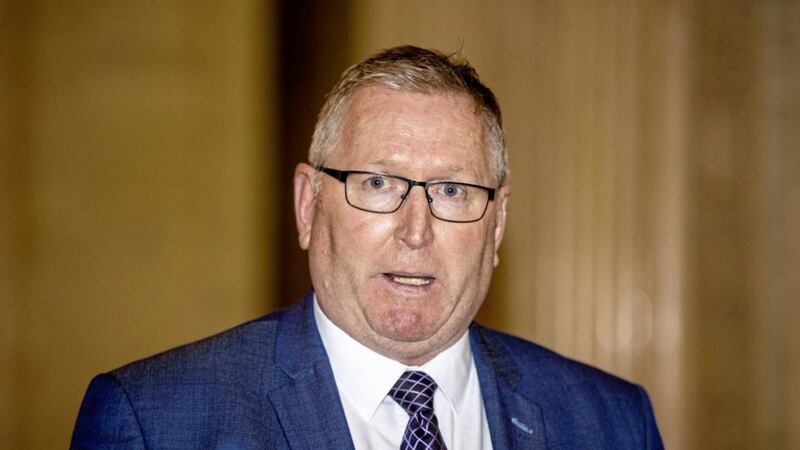The DUP’s inability to properly collapse Stormont stands increasingly exposed.
Monday’s recall debate to appoint a speaker became a wide-ranging debate on DUP irresponsibility. Sinn Féin is promising further recalls on a regular basis.
During the debate, the UUP revealed it has asked the civil service to convene all-party talks on a programme for government and asked Sinn Féin caretaker finance minister Conor Murphy to reopen public consultation on the budget.
The UUP’s willingness to engage in such processes ensures cross-community credibility even if the DUP refuses to participate. It marks a change from February, when the UUP stopped Sinn Féin convening a Party Leaders’ Forum without inviting the DUP.
Coming into view by June 24 is the first of the debates the assembly must hold every six weeks under New Decade, New Approach “to consider progress” on appointing a first and deputy first minister. The rules do not envisage how this can happen without a speaker. It is likely to prove another moment when everyone else decides to find a way around the DUP obstruction.
**
Sinn Féin is hamstrung complaining about the DUP’s Stormont boycott after walking out itself for three years. The party has devised a response for its representatives when this point is put to them by the media. It also got an airing from Conor Murphy in the assembly on Monday.
Yes, Sinn Féin did walk out in 2017, goes the party line, but it reached a deal with the DUP in early 2018 to go back in, only for the DUP to get cold feet at the last minute over Irish language legislation. While this is an accurate record of events, the implication that the DUP was responsible for the next two years of collapse does not follow. Sinn Féin could still have restored Stormont at any point by returning to office. It was entirely its choice not to do so.
**
A disturbing BBC Spotlight investigation into the PSNI in Coleraine has generated a lot of press and political reaction. Much of this has focused on offensive messages uncovered from a Whatsapp group, but this seems like a sideshow compared to the programme’s central finding. When allegations of serious misconduct were raised, the two whistleblowers - one a senior officer - were themselves placed under investigation with devastating consequences for their careers.
The PSNI’s internal investigation system not only allowed this to happen - it was used, very effectively, to make it happen.
**
Ireland’s former transport minister Shane Ross has claimed the chaotic scenes at Dublin Airport are “because it is a state monopoly” with no commercial competition, where the only consequences for failure are penalties that amount to the government fining itself. While none of that may help, none of it applies to Belfast International Airport, which has experienced similar problems in recent months despite being privatised three decades ago and facing a highly competitive rival at Belfast City.
Staff shortages at airports across the UK are being blamed on Brexit, yet Dublin shows that is not the explanation either.
The clearest common denominator, public and private, British and Irish, is a management culture across the economy of penny-pinching on staff and wages instead of investing in productivity. In the end, this was always going to run out of ‘fat to cut’.
**
There is growing political attention in the Republic on the number of vacant domestic properties. The government says it wants to introduce a tax on them “as soon as possible”.
Stormont dropped rate relief on empty houses in 2011. As an assembly answer last week noted, this means there is no longer “any financial advantage” in reporting a property vacant, so the official figure of around 22,000 empty properties in Northern Ireland “may not be current or complete”.
Any government might consider a measure that raises revenue and undermines a controversial statistic to be the best of both worlds.
**
France goes to the polls next weekend for the first of two rounds of parliamentary elections. It is surprising how little notice is being paid to this in Northern Ireland, given the potentially major implications. Jean-Luc Mélenchon, who missed out on the presidency in April, has an outside chance of becoming prime minister. Often described as the French Jeremy Corbyn, he is a committed Eurosceptic - but anti-protocol unionists should not get their hopes up. He is also a committed Irish republican: his party issued a statement supporting Sinn Féin and a united Ireland as recently as St Patrick’s Day this year.
**
The UK and Ireland have a memorandum on providing public healthcare for each other’s citizens. Nobody suggests this means Britain would have to keep paying for Northern Ireland’s hospitals in a united Ireland, because that would be preposterous - people moving between countries and a transfer of territory between countries are plainly unrelated scenarios.
However, some nationalists are suggesting the UK and Ireland’s social security treaty, covering certain benefits for each other’s citizens, means Britain would have to keep paying Northern Ireland’s state pension in a united Ireland.
It beggars belief anyone is taking this seriously. A united Ireland could pay its own benefits bill, as of course it would have to.









